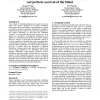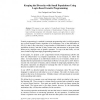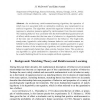99 search results - page 19 / 20 » Evolving Crossover Operators for Function Optimization |
GECCO
2007
Springer
13 years 12 months ago
2007
Springer
An agent population can be evolved in a complex environment to perform various tasks and optimize its job performance using Learning Classifier System (LCS) technology. Due to the...
GECCO
2007
Springer
13 years 12 months ago
2007
Springer
A new family of "Distribution Replacement” operators for use in steady state genetic algorithms is presented. Distribution replacement enforces the members of the populatio...
GECCO
2010
Springer
13 years 6 months ago
2010
Springer
This paper takes an economic approach to derive an evolutionary learning model based entirely on the endogenous employment of genetic operators in the service of self-interested a...
GECCO
2004
Springer
13 years 11 months ago
2004
Springer
We present a new method of Logic-Based Genetic Programming (LBGP). Using the intrinsic mechanism of backtracking in Prolog, we utilize large individual programs with redundant clau...
ECAL
2005
Springer
13 years 11 months ago
2005
Springer
An evolutionary reinforcement-learning algorithm, the operation of which was not associated with an optimality condition, was instantiated in an artificial organism. The algorithm ...



